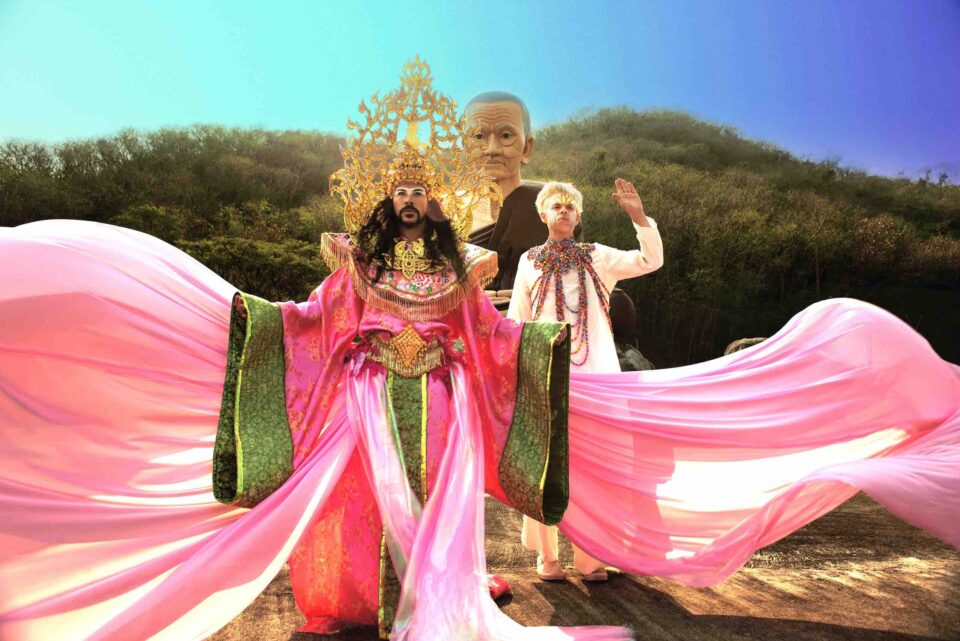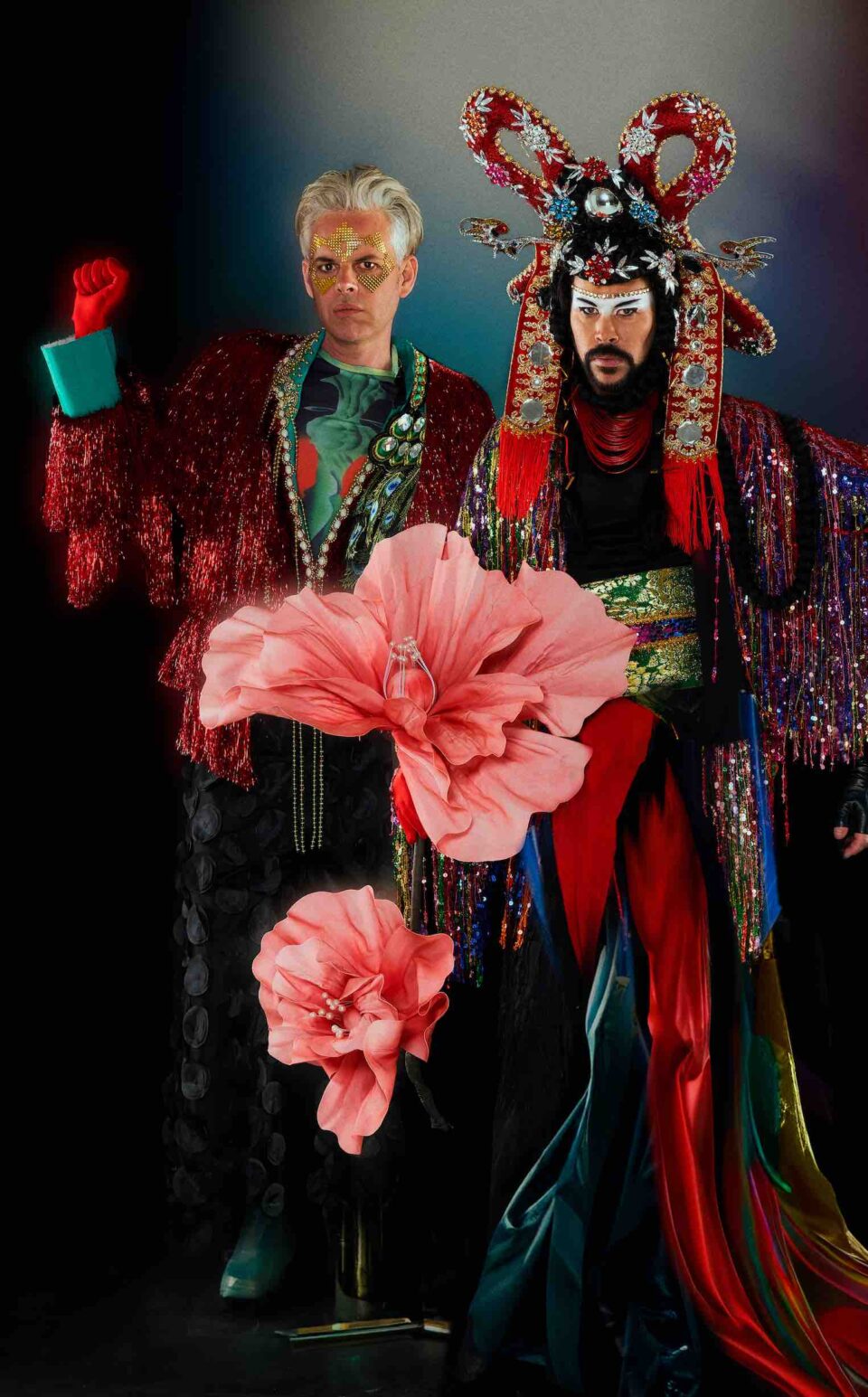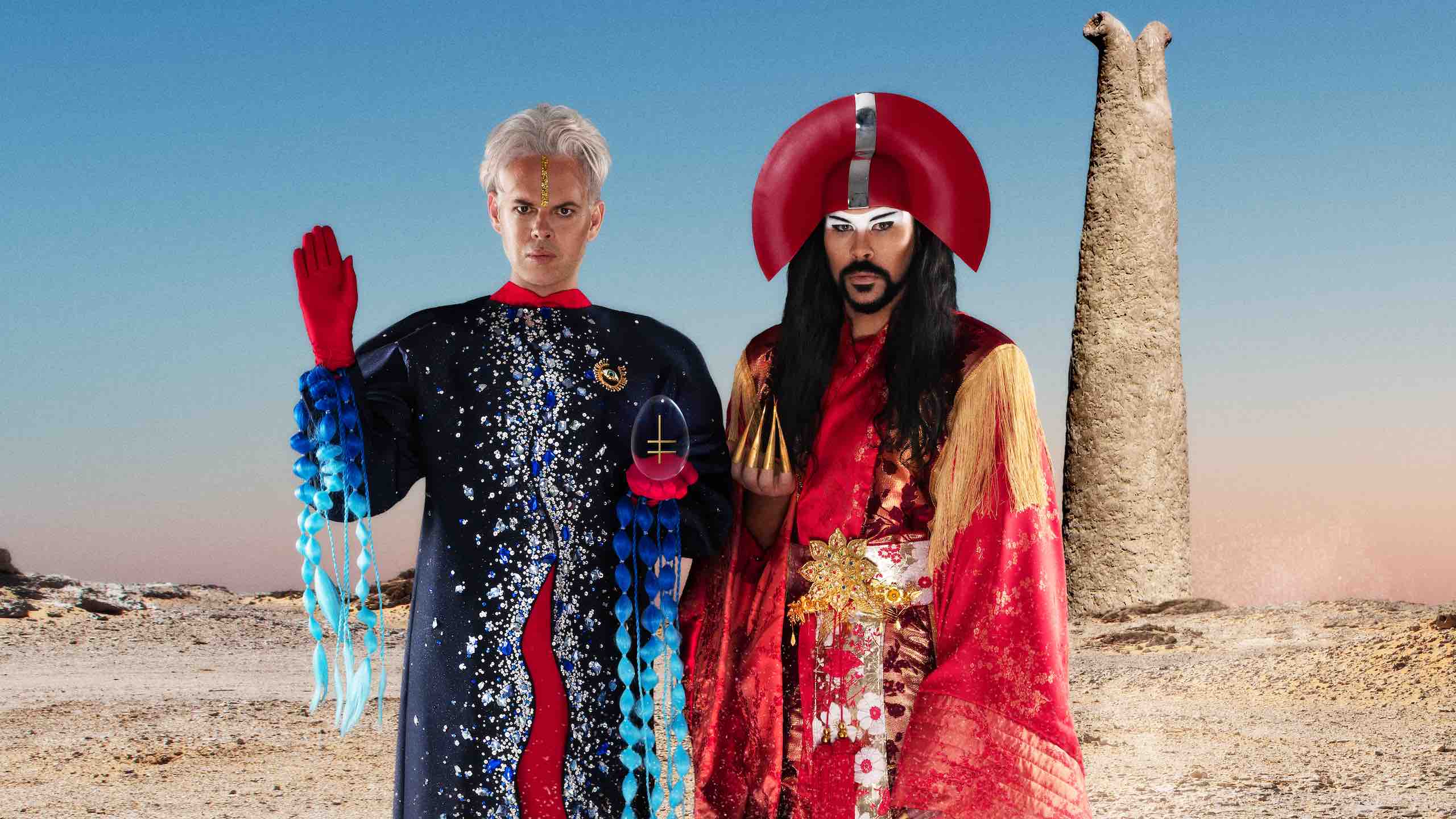If you’re only familiar with Empire of the Sun because of their chart-topping hits, you may not have realized that the Australian duo have been working on their fourth album, Ask That God, for eight years. When Luke Steele and Nick Littlemore—who adopt the names Emperor Steele and Lord Littlemore on stage—begin explaining to me why it took so long to release a new record, it becomes immediately clear that its title was a reflection of the meditative, serene process of harnessing creativity.
The new album had its origins in Japan, circa 2018, where Steele and Littlemore found inspiration at a modular synthesizer festival and began sketching songs for the album. Though they’ve crafted some of the biggest pop songs of the 2010s, the duo felt no need to rush the recording process. They traveled, Nick studied art, Luke surfed big waves. They lived and waited for inspiration to hit. Though it sometimes felt like walking in concrete boots, as Steele explains, the result was worth it. On Ask That God, Empire of the Sun sounds genuinely excited to be making music again. They caught the angel by the tail, as Littlemore puts it, and they didn’t let go until Ask That God emerged from its mouth.
With the record out today via EMI, we discussed inspiration, cosmic paths, and committing to maximalism in their work.
Eight years is a long time. What’s the overarching feeling?
Luke Steele: Man, we’re so excited because right as the pandemic hit, we were exhausted. We’ve been working together for 20 years, so it was time to turn off all the computers, just abandon the studio. When we came back, probably a year and a half later, we reinstalled new software and rebuilt everything. It feels like a whole new chapter for Empire, really.
Nick Littlemore: I think it was probably forced by interplanetary controls. It wasn’t necessarily our doing. We’re both obsessed with creativity. Unless we’re told by some divine force, we’re probably not going to stop creating. The path of Empire is never typical. It’s always led by some sort of heart swell or something cosmic, I would say.
Can you point to what was cosmic with Ask That God?
Littlemore: It’s been long enough that I was daunted by how much of a privilege it’s been to work with Luke. Those eight years gave me pause to reflect on that, and as a result, I think going back into the studio when we did was such a joy. It was like being a child again, when you’re just playing and discovering things for the first time. That’s how we started making music, and now we’re back in that place of novelty and pure fascination. I don’t think we want to leave that space now. I think we want to make a ton more stuff.
Steele: It’s like that thing when something’s gone, you realize what’s so precious about it and what you loved about it so much. It felt good to abandon the castle—this thing that we’d built which was so beautiful and elaborate. To let it become consumed by vines and reeds was a good feeling.
“We reinstalled new software and rebuilt everything. It feels like a whole new chapter for Empire, really.” — Luke Steele
When did the official writing process for the record begin?
Littlemore: It actually began in Japan. We were shooting a video for “Way to Go,” and it was Luke’s first time in Japan. We were so inspired, we managed to book a studio. It was right in the middle of Roppongi, which is kind of like the chaotic part of Tokyo.
Steele: We went to a modular festival, which was in a sort of underground basement, and it was a Japanese modular synthesizer guru set up with these machines. It was like a sonic battle. And we approached the person who looked like the winner of the tournament and asked him to come into the studio. He came in and he started soldering synths together to make sounds for us on the spot.
Do you think that location played a role in the way the album eventually sounded?
Steele: Yeah. That’s what I love about the band. We go places and we collect spices and ingredients and it just naturally flows into the water that we drink. Now we’re in Hawaii, back at our home away from home, our island studio where we worked on Two Vines. We got so many songs for that record from just being on the island and taking in the flow of the people.

Let’s talk about the album title. Ask That God can mean a lot of things.
Steele: I think it felt obvious pre-pandemic. We’d done so many sessions, and it felt like concrete boots for a while. We were just running into walls. When the spirit’s not with this band, it just sounds like nothing. We were both exhausted. I think it did get to the point that we just have to be led by the spirit. We were talking a lot about, “Don’t ask the world, ask the eternal God.”
Littlemore: We’d created a project that for a lot of people was their place to go when they were in tough times. For us to say, “Ask that God,” it really could be that for you. But for us, we have our own places we go in terms of asking a higher energy or entity or whatever. It could be a parent, it could be something metaphysical, itcould be a book, itcould be anything. It’s the acknowledgement of the other—or the creator—that we can’t do this alone.
Steele: I think the record really started taking off when we both surrendered certain things. In art school, there were fine art kids across one side of the road, and then I was at the graphic design department and I’ve got that calculated mind where it’s like, “This has to be here.” But I think for me, surrendering to some of the things Nick would suggest, it’d be across the road at the fine art. Nick also surrendered to other things.
Is it difficult waiting for that spirit to strike you, for inspiration to come?
Littlemore: No, I think it’s fun. If we’re waiting for something, we’re still making things and we’re still finding that compelling. But it’s different when there’s that entity in the room, where you know that you’ve got an angel by the tail or whatever, and you’re writing it all down.
“Unless we’re told by some divine force, we’re probably not going to stop creating. The path of Empire is never typical. It’s always led by some sort of heart swell or something cosmic.” — Nick Littlemore
It’s so fickle and minute, the difference between an idea going nowhere and an idea going somewhere.
Steele: That’s what’s so fascinating: how there’s that line. God is only one thought away in one moment. A song could be not great, but maybe switching the key and bumping the tempo and adding some different ingredients—all of a sudden it’s the greatest thing you’ve ever made.
How do you balance creating the arena-ready festival anthems versus the deep cuts that animate all of your albums?
Steele: I think we’re pressing into opening up the palette a bit more on this record. We did so much crazy music—from drone stuff to electronic instrumental music—but the first record started in that palette, where everything was more open. I guess it got a bit more subdued in the next two records. We’re sort of trying to bridge that now and open the gates to that wider palette.
Littlemore: Whatever we’re doing, we’re always met with a king tide’s worth of emotion. It could come out as drone, it could come out as a full song, or anything in between. That’s why we inspire each other, and we always have. We don’t like to do things by half. It’s all the way in. Even if it’s just noise art, it’s going to be the noisiest noise art you’ve ever heard. Even though the records could be minimal, there’s an intent for things just to be gargantuan.
“That’s what I love about the band. We go places and we collect spices and ingredients and it just naturally flows into the water that we drink.” — Luke Steele

Is that approach the way you two live your lives, or is that completely separate?
Steele: We just want to get better and better. We’re still students, really. You put on a Bowie record and you’re like, “Oh, you got a lot of work to do.” All this is is us trying to find better ways to tell the story.
Littlemore: Yeah, and I think living lives to tell those stories. Luke’s often surfing big waves and having that experience with a force much greater—of the ocean and all those sorts of things. I think there’s an element to adventure that comes through our lives, and obviously we fantasize about that.
A really dumb question just popped in my head, but if you don’t mind indulging me, what movie would the band be named after if it wasn’t Empire of the Sun?
Steele: Back to the Future.
Littlemore: Yeah. You could go with darker things like Kubrick, but it’s not really fitting with Empire. As inspiring as it is, there’s something sort of sugar-coated and very sweet about the Empire experience. Roland Corporation makes synthesizers, and synths can make the craziest sounds, but the Roland ones are all in the sweet spot. You can’t make a super ugly sound with a Roland. It’s a bit like Empire. We always stay right in the light of the goodness. We don’t make those darker, weirder, murky things. We want our vision to be clear.
The new record is joyful. And a celebration.
Littlemore: I think we’re celebrating being back as much as the audience is. FL







